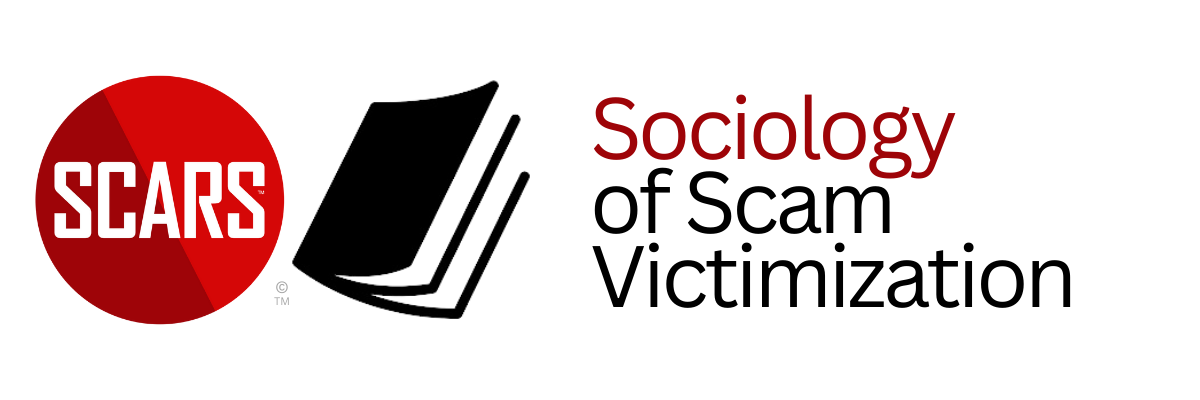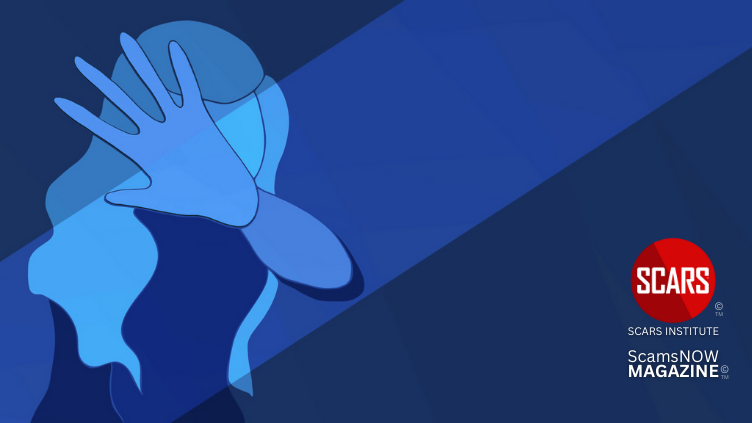Sociology of Scam Victimization – A Brief Introduction
An Understanding of the Process and Impact of Victimization of Scam Victims
Primary Category: Sociology of Scam Victimization
Author:
• Tim McGuinness, Ph.D., DFin, MCPO, MAnth – Anthropologist, Scientist, Polymath, Director of the Society of Citizens Against Relationship Scams Inc.
About This Article
The Sociology of Scam Victimization examines the social dynamics, stigmas, and institutional responses that shape the experiences of individuals deceived by scams. Scam victims often face social stigma, being unfairly blamed and labeled as gullible, which can lead to feelings of shame, guilt, and isolation.
The concept of the “Chain of Suspicion” highlights how mistrust spreads from the victim to their social circle and institutions, further complicating recovery. Understanding these dynamics is crucial for developing effective prevention strategies, improving support systems, and addressing the societal factors that contribute to scam victimization.

The Sociology of Scam Victimization: Understanding the Social Dynamics of Deception and Victimization
Introduction to the Sociology of Scam Victimization
The Sociology of Scam Victimization: Scams and fraud have become increasingly prevalent in the digital age, affecting millions of individuals worldwide. While the financial and emotional impacts of scams are often discussed, the sociological aspects of being a scam victim are less frequently explored. The sociology of scam victims delves into the social dynamics, stigmas, and institutional responses that shape the experiences of those who have fallen prey to scams. Understanding these sociological factors is crucial for developing more effective support systems and preventing further victimization.
Axioms of Sociology of Scam Victims
Here are the SCARS Institute axioms for The Sociology of Scam Victimization, focusing on the unique social dynamics and psychological experiences that scam victims face:
1. Scam Victimization is a Socially Constructed Experience:
-
- The experience of being scammed is not a personal failure or misjudgment; it is shaped by broader social, cultural, and economic factors. Societal attitudes toward trust, technology, and psychological vulnerability play significant roles in how scam victimization is perceived and experienced.
2. Scam Victimization Disproportionately Affects Vulnerable Populations:
-
- Certain groups within society, such as the elderly, disabled, neurologically divergent, those with low digital literacy, and socially isolated individuals, are more susceptible to scams. Structural inequalities and personal vulnerabilities contribute to the likelihood and impact of becoming a scam victim.
3. The Response to Scam Victimization is Context-Dependent:
-
- The way society, including law enforcement, social networks, and media, responds to scam victims varies depending on the type of scam, the victim’s identity, and societal perceptions of blame and responsibility. Victims may receive sympathy or be unfairly blamed for their victimization.
4. Scam Victimization Has Long-Term Psychological and Social Effects:
-
- Beyond the immediate financial loss, scam victims often suffer long-term psychological impacts, including trauma, shame, and a loss of trust in others. These effects can lead to social withdrawal and a lasting sense of vulnerability.
5. Victims Have Agency in Their Recovery:
-
- Despite the disempowerment caused by scams, victims can take active steps toward recovery. This involves reclaiming their narrative, seeking social support, and accessing resources that help rebuild their sense of security and self-worth. They can also avoid this agency.
6. Support Systems Reflect Societal Values Towards Scam Victims:
-
- The availability and quality of support for scam victims, such as counseling, legal assistance, and public awareness campaigns, reflect societal values. Societies that prioritize victim support are more likely to offer comprehensive and accessible services to scam victims.
7. Secondary Victimization is a Significant Risk for Scam Victims:
-
- Scam victims often face secondary victimization through blame, shame, and stigmatization from society and institutions. This can compound the initial trauma and create additional barriers to recovery.
8. Public Perception of Scam Victims is Shaped by Media Representations:
-
- Media plays a significant role in shaping how scam victims are perceived by society. Media narratives can either reinforce negative stereotypes of gullibility or highlight the sophisticated tactics used by scammers, influencing public empathy and support for victims.
9. The Recognition of Scam Victimhood is Politically and Socially Contested:
-
- The recognition of scam victims as legitimate victims deserving of support and protection is often contested, particularly by financial institutions. This can involve debates over the victim’s responsibility, the role of technology companies, and the adequacy of legal protections.
10. Scam Victimization Can Lead to Social and Legal Change:
-
- The experiences and advocacy of scam victims can drive social movements and policy changes aimed at improving protections against scams. High-profile cases and patterns of widespread scam victimization can lead to reforms in consumer protection laws, financial regulations, and public awareness efforts.
These axioms offer a foundational understanding of the unique challenges and social dynamics that scam victims face, providing a framework for analyzing and supporting their experiences within a sociological context.
The Social Stigma of Being a Scam Victim
One of the most significant sociological aspects of scam victimization is the stigma attached to it. In many societies, there is a pervasive belief that individuals who fall for scams are somehow at fault, often labeled as gullible, naive, or irresponsible. This stigma can lead to victim-blaming, where the victim is held partially or entirely responsible for their misfortune. The blame may come from friends, family, or even law enforcement, who might question the victim’s judgment or decision-making.
This social stigma can have severe consequences for victims. It can lead to feelings of shame, guilt, and isolation, further compounding the emotional distress caused by the scam itself. Victims may be reluctant to seek help or report the scam, fearing judgment or ridicule from others. This reluctance can, in turn, hinder their recovery process and make them more vulnerable to future scams.
The Chain of Suspicion
In the sociology of scam victims, the concept of the “Chain of Suspicion” plays a crucial role. This term refers to the ripple effect of mistrust that spreads from the victim to those around them and even to institutions. When someone is scammed, the initial reaction of their social circle might be one of skepticism. Friends and family might question the victim’s story, wondering how they could have been deceived. This suspicion can extend to the victim’s judgment and credibility in other areas of life, damaging personal relationships.
The Chain of Suspicion also affects how institutions, such as banks, law enforcement, and consumer protection agencies, handle scam cases. Victims might find that their claims are met with doubt or that the response is slow and inadequate. This institutional suspicion can make it harder for victims to recover lost assets or gain legal redress, further exacerbating their sense of helplessness and frustration.
Key Aspects of the Chain of Suspicion:
Victim Blaming: Often, the first link in the chain is the victim themselves. When a scam is revealed, victims are sometimes viewed with suspicion by others who might question their judgment, intelligence, or honesty. This can lead to victim blaming, where the victim is seen as partially responsible for their own victimization due to perceived gullibility or recklessness.
Suspicion of Affiliates: The suspicion can extend to those associated with the victim, such as family members or close friends, who may also be scrutinized for their role (or perceived lack of intervention) in the victim’s entanglement with the scam. This could create tension and strain relationships, as others might question why the scam was not detected or prevented earlier.
Distrust of Authorities: Victims themselves may develop distrust towards institutions like banks, law enforcement, or consumer protection agencies if they feel these entities did not protect them adequately or were dismissive of their plight. This distrust can perpetuate a cycle of suspicion, where victims are reluctant to seek help due to fear of being judged or not taken seriously.
Institutional Suspicion: Financial institutions and law enforcement agencies, tasked with investigating scams, may also develop a general suspicion towards individuals who report being scammed. This could result in slower response times or a lack of empathy in handling cases, as officials might question the authenticity of the victim’s claims or suspect that the victim might be complicit in the scam.
Perpetuation of Stigma: As the chain of suspicion extends, a stigma can develop around being a scam victim, where others, out of fear of being associated with the scam or becoming a victim themselves, begin to distance themselves from the victim. This social isolation further deepens the psychological impact on the victim and can hinder their recovery.
Implications for Scam Victims:
The “Chain of Suspicion” can exacerbate the emotional and social trauma experienced by scam victims. It creates an environment where the victim not only has to deal with the aftermath of the scam but also the mistrust and skepticism of those around them. This can lead to further victimization, where the individual is unfairly judged or isolated by their community.
To break this chain, it is essential to promote a more compassionate and understanding approach toward scam victims, emphasizing support rather than judgment, and ensuring that institutions responsible for protecting and aiding victims are trained to handle such cases with the sensitivity they require.
Social Isolation and Its Consequences
Scam victims often face profound social isolation following their victimization, primarily due to the stigma and suspicion that society attaches to those who have been deceived. The experience of being scammed is frequently met with harsh judgment, where victims are unfairly blamed for their perceived gullibility or naivety. This judgment leads many victims to withdraw from social interactions, either to avoid the criticism of others or because they internalize the blame and feel ashamed of what has happened. This withdrawal creates a dangerous cycle: as victims isolate themselves, they lose access to the emotional and social support that is crucial for recovery. The absence of a supportive network not only exacerbates the psychological damage caused by the scam but also hinders the healing process, making it difficult for victims to regain their self-confidence and trust in others.
The consequences of social isolation extend beyond emotional damage, as it also increases the vulnerability of scam victims to future scams. Without a network of trusted individuals to provide perspective, advice, and warnings, victims may be more likely to fall prey to similar schemes again. Scammers are acutely aware of this vulnerability and often exploit it by using tactics such as “love bombing”—overwhelming the victim with affection and attention—or offering false friendship to create a sense of connection and trust. These manipulative strategies are designed to fill the void left by the victim’s isolation, making them more susceptible to further deception. The cycle of isolation and re-victimization can become a recurring pattern, deeply entrenching the victim’s sense of hopelessness and further distancing them from the social support they need to break free from the cycle of exploitation. Recognizing and addressing this cycle is crucial in developing effective interventions and support systems for scam victims, ensuring they have the resources and community connections necessary to recover fully and avoid further harm.
Social isolation can also make victims more susceptible to future scams. Without a supportive social network to provide perspective and advice, victims may be more likely to fall for similar schemes again. Scammers often exploit this isolation, using tactics such as love bombing or false friendship to create a sense of connection and trust with the victim, only to deceive them further.
The Role of Social Networks in Scam Prevention and Recovery
Social networks play a crucial role in both the prevention of scams and the recovery process for those who have fallen victim to them. While social isolation increases a person’s susceptibility to scams, a strong, supportive network of friends, family, and community members acts as a significant protective factor. In the context of scam prevention, social networks serve as a valuable source of information and vigilance. Friends and family can share warnings about common scams, educate each other on recognizing red flags, and provide advice on how to handle suspicious situations. The collective knowledge and experiences within a social group can help individuals stay alert to potential threats, reducing the likelihood of falling prey to scams.
In the aftermath of a scam, re-engaging with social networks becomes even more critical for victims. The emotional toll of being scammed can lead to feelings of shame, guilt, and self-blame, which often drive victims into further isolation. However, a supportive social network can provide the necessary emotional reassurance that helps victims overcome these negative feelings. Support groups, both online and offline, offer a safe and understanding environment where victims can share their stories without fear of judgment. These groups are not only a source of emotional comfort but also a practical resource for recovery. Members can exchange strategies for dealing with the financial and legal aftermath of a scam, discuss ways to rebuild trust and self-confidence, and offer guidance on how to protect oneself from future scams. Additionally, by connecting with others who have gone through similar experiences, victims can begin to see that they are not alone, which is often a crucial step in the healing process.
Moreover, social networks can act as a buffer against future victimization. When individuals stay connected with their communities, they are more likely to receive timely warnings about emerging scams and more readily seek advice before making potentially risky decisions. This ongoing support can help prevent re-victimization, which is a common risk for those who have already been scammed. In essence, strong social networks serve as both a shield and a lifeline, offering protection, support, and a path to recovery for scam victims. Recognizing the importance of these networks and fostering them can significantly enhance both individual and community resilience against scams.
Institutional Responses and the Need for Change
The way institutions respond to scam victims is a critical aspect of the Sociology of Scam Victimization. Often, the institutional response is inadequate, with victims encountering bureaucratic hurdles, slow investigations, and a lack of empathy from those tasked with helping them. This inadequate response can reinforce the Chain of Suspicion and contribute to the victim’s sense of powerlessness.
To improve outcomes for scam victims, there is a need for institutions to adopt a more victim-centered compassionate approach. This includes providing timely and empathetic support, simplifying the process of reporting scams, and ensuring that victims are treated with respect and dignity. Public awareness campaigns can also help to reduce the stigma associated with being a scam victim, encouraging more people to come forward and seek help.
Summary
The Sociology of Scam Victimization highlights the complex social dynamics that influence how victims are perceived, treated, and supported. Understanding these dynamics is essential for developing more effective prevention strategies, improving institutional responses, and ultimately helping victims to recover. By addressing the stigma, suspicion, and isolation that often accompany scam victimization, society can better support those who have been deceived and work towards reducing the incidence of scams in the future.
-/ 30 /-
What do you think about this?
Please share your thoughts in a comment below!
A Note About Labeling!
We often use the term ‘scam victim’ in our articles, but this is a convenience to help those searching for information in search engines like Google. It is just a convenience and has no deeper meaning. If you have come through such an experience, YOU are a Survivor! It was not your fault. You are not alone! Axios!
Statement About Victim Blaming
SCARS Institute articles examine different aspects of the scam victim experience, as well as those who may have been secondary victims. This work focuses on understanding victimization through the science of victimology, including common psychological and behavioral responses. The purpose is to help victims and survivors understand why these crimes occurred, reduce shame and self-blame, strengthen recovery programs and victim opportunities, and lower the risk of future victimization.
At times, these discussions may sound uncomfortable, overwhelming, or may be mistaken for blame. They are not. Scam victims are never blamed. Our goal is to explain the mechanisms of deception and the human responses that scammers exploit, and the processes that occur after the scam ends, so victims can better understand what happened to them and why it felt convincing at the time, and what the path looks like going forward.
Articles that address the psychology, neurology, physiology, and other characteristics of scams and the victim experience recognize that all people share cognitive and emotional traits that can be manipulated under the right conditions. These characteristics are not flaws. They are normal human functions that criminals deliberately exploit. Victims typically have little awareness of these mechanisms while a scam is unfolding and a very limited ability to control them. Awareness often comes only after the harm has occurred.
By explaining these processes, these articles help victims make sense of their experiences, understand common post-scam reactions, and identify ways to protect themselves moving forward. This knowledge supports recovery by replacing confusion and self-blame with clarity, context, and self-compassion.
Additional educational material on these topics is available at ScamPsychology.org – ScamsNOW.com and other SCARS Institute websites.
-/ 30 /-
What do you think about this?
Please share your thoughts in a comment below!
Important Information for New Scam Victims
- Please visit www.ScamVictimsSupport.org – a SCARS Website for New Scam Victims & Sextortion Victims.
- SCARS Institute now offers its free, safe, and private Scam Survivor’s Support Community at www.SCARScommunity.org – this is not on a social media platform, it is our own safe & secure platform created by the SCARS Institute especially for scam victims & survivors.
- SCARS Institute now offers a free recovery learning program at www.SCARSeducation.org.
- Please visit www.ScamPsychology.org – to more fully understand the psychological concepts involved in scams and scam victim recovery.
If you are looking for local trauma counselors, please visit counseling.AgainstScams.org
If you need to speak with someone now, you can dial 988 or find phone numbers for crisis hotlines all around the world here: www.opencounseling.com/suicide-hotlines
Statement About Victim Blaming
Some of our articles discuss various aspects of victims. This is both about better understanding victims (the science of victimology) and their behaviors and psychology. This helps us to educate victims/survivors about why these crimes happened and not to blame themselves, better develop recovery programs, and help victims avoid scams in the future. At times, this may sound like blaming the victim, but it does not blame scam victims; we are simply explaining the hows and whys of the experience victims have.
These articles, about the Psychology of Scams or Victim Psychology – meaning that all humans have psychological or cognitive characteristics in common that can either be exploited or work against us – help us all to understand the unique challenges victims face before, during, and after scams, fraud, or cybercrimes. These sometimes talk about some of the vulnerabilities the scammers exploit. Victims rarely have control of them or are even aware of them, until something like a scam happens, and then they can learn how their mind works and how to overcome these mechanisms.
Articles like these help victims and others understand these processes and how to help prevent them from being exploited again or to help them recover more easily by understanding their post-scam behaviors. Learn more about the Psychology of Scams at www.ScamPsychology.org
SCARS INSTITUTE RESOURCES:
If You Have Been Victimized By A Scam Or Cybercrime
♦ If you are a victim of scams, go to www.ScamVictimsSupport.org for real knowledge and help
♦ SCARS Institute now offers its free, safe, and private Scam Survivor’s Support Community at www.SCARScommunity.org/register – this is not on a social media platform, it is our own safe & secure platform created by the SCARS Institute especially for scam victims & survivors.
♦ Enroll in SCARS Scam Survivor’s School now at www.SCARSeducation.org
♦ To report criminals, visit https://reporting.AgainstScams.org – we will NEVER give your data to money recovery companies like some do!
♦ Follow us and find our podcasts, webinars, and helpful videos on YouTube: https://www.youtube.com/@RomancescamsNowcom
♦ Learn about the Psychology of Scams at www.ScamPsychology.org
♦ Dig deeper into the reality of scams, fraud, and cybercrime at www.ScamsNOW.com and www.RomanceScamsNOW.com
♦ Scam Survivor’s Stories: www.ScamSurvivorStories.org
♦ For Scam Victim Advocates visit www.ScamVictimsAdvocates.org
♦ See more scammer photos on www.ScammerPhotos.com
You can also find the SCARS Institute’s knowledge and information on Facebook, Instagram, X, LinkedIn, and TruthSocial
Psychology Disclaimer:
All articles about psychology and the human brain on this website are for information & education only
The information provided in this and other SCARS articles are intended for educational and self-help purposes only and should not be construed as a substitute for professional therapy or counseling.
Note about Mindfulness: Mindfulness practices have the potential to create psychological distress for some individuals. Please consult a mental health professional or experienced meditation instructor for guidance should you encounter difficulties.
While any self-help techniques outlined herein may be beneficial for scam victims seeking to recover from their experience and move towards recovery, it is important to consult with a qualified mental health professional before initiating any course of action. Each individual’s experience and needs are unique, and what works for one person may not be suitable for another.
Additionally, any approach may not be appropriate for individuals with certain pre-existing mental health conditions or trauma histories. It is advisable to seek guidance from a licensed therapist or counselor who can provide personalized support, guidance, and treatment tailored to your specific needs.
If you are experiencing significant distress or emotional difficulties related to a scam or other traumatic event, please consult your doctor or mental health provider for appropriate care and support.
Also read our SCARS Institute Statement about Professional Care for Scam Victims – click here
If you are in crisis, feeling desperate, or in despair, please call 988 or your local crisis hotline – international numbers here.
More ScamsNOW.com Articles
A Question of Trust
At the SCARS Institute, we invite you to do your own research on the topics we speak about and publish. Our team investigates the subject being discussed, especially when it comes to understanding the scam victims-survivors’ experience. You can do Google searches, but in many cases, you will have to wade through scientific papers and studies. However, remember that biases and perspectives matter and influence the outcome. Regardless, we encourage you to explore these topics as thoroughly as you can for your own awareness.















![NavyLogo@4x-81[1] Sociology of Scam Victimization - A Brief Introduction - 2024](https://scamsnow.com/wp-content/uploads/2025/04/NavyLogo@4x-811.png)









![scars-institute[1] Sociology of Scam Victimization - A Brief Introduction - 2024](https://scamsnow.com/wp-content/uploads/2025/04/scars-institute1.png)

![niprc1.png1_-150×1501-1[1] Sociology of Scam Victimization - A Brief Introduction - 2024](https://scamsnow.com/wp-content/uploads/2025/04/niprc1.png1_-150x1501-11.webp)